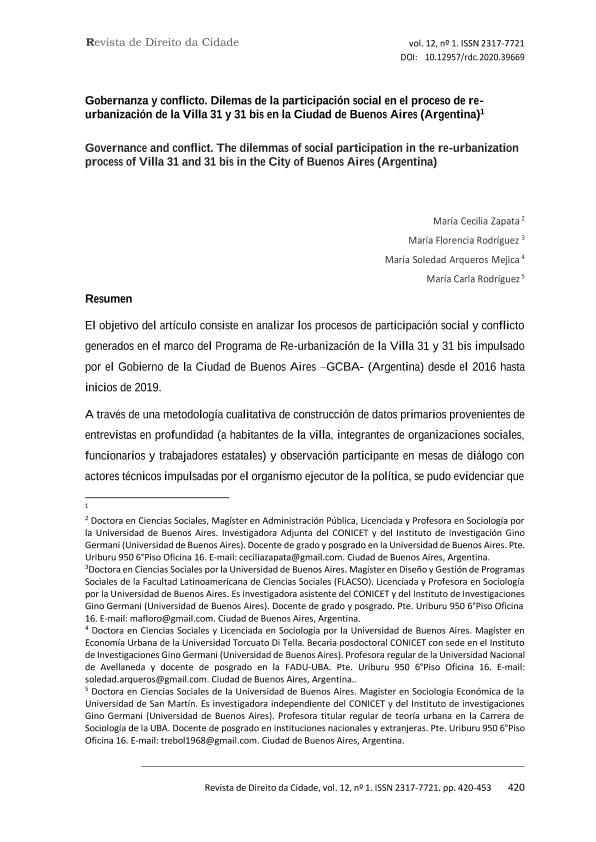Mostrar el registro sencillo del ítem
dc.contributor.author
Zapata, María Cecilia

dc.contributor.author
Rodriguez, Maria Florencia

dc.contributor.author
Arqueros Mejica, Maria Soledad

dc.contributor.author
Rodriguez, Maria Carla

dc.date.available
2022-09-20T12:55:20Z
dc.date.issued
2020-07
dc.identifier.citation
Zapata, María Cecilia; Rodriguez, Maria Florencia; Arqueros Mejica, Maria Soledad; Rodriguez, Maria Carla; Gobernanza y conflicto: dilemas de la participación social en el proceso de reurbanización de la Villa 31 y 31 bis en la Ciudad de Buenos Aires (Argentina); Universidad del Estado de Rio de Janeiro; Revista de Direito da Cidade; 12; 1; 7-2020; 420-453
dc.identifier.issn
2317-7721
dc.identifier.uri
http://hdl.handle.net/11336/169501
dc.description.abstract
El objetivo del artículo consiste en analizar los procesos de participación social y conflicto generados en el marco del Programa de Re-urbanización de la Villa 31 y 31 bis impulsado por el Gobierno de la Ciudad de Buenos Aires –GCBA- (Argentina) desde el 2016 hasta la actualidad. A través de una metodología cualitativa de construcción de datos primarios provenientes de entrevistas en profundidad (a habitantes de la villa, integrantes de organizaciones sociales, funcionarios y trabajadores estatales) y observación participante en mesas de diálogo con actores técnicos impulsadas por el organismo ejecutor de la política, se pudo evidenciar que existe gran descontento de los habitantes en torno a las instancias de participación social esgrimidas por el programa, con altos niveles de conflictividad territorial. Esto da cuenta que los permanentes mecanismos de participación en la ejecución de política no son garantía per sé de que todos los actores tengan el mismo peso en la toma de decisiones. Más bien las distintas técnicas desplegadas por la nueva gobernanza remiten a prácticas de legitimación de una política habitacional que implícitamente busca la valorización de la ciudad neoliberal, lejos de construir instancias de consenso y participación real que redunden en la reducción de la desigualdad socio-urbana.
dc.description.abstract
The objective of the article is to analyze the processes of social participation and conflict generated within the framework of the Re-urbanization Program of Villa 31 and 31 bis promoted by the Government of the City of Buenos Aires (GCBA) (Argentina) since 2016 until today. Through a qualitative methodology of construction of primary data coming from in-depth interviews (to inhabitants of the town, members of social organizations, officials and state workers) and participant observation in dialogues with technical actors driven by the executing agency of the political, it was evident that there is great discontent of the inhabitants around the instances of social participation wielded by the program, with high levels of territorial conflict. This implies that the permanent mechanisms of participation in the execution of policy are not guarantee per I know that all the actors have the same weight in the decision making. Rather, the different techniques deployed by the new governance refer to practices of legitimation of a housing policy that implicitly seeks the valorization of the neoliberal city, far from building instances of consensus and real participation that result in the reduction of socio-urban inequality.
dc.format
application/pdf
dc.language.iso
spa
dc.publisher
Universidad del Estado de Rio de Janeiro
dc.rights
info:eu-repo/semantics/openAccess
dc.rights.uri
https://creativecommons.org/licenses/by/2.5/ar/
dc.subject
GOBERNANZA
dc.subject
PARTICIPACIÓN
dc.subject
CONFLICTO
dc.subject
REURBANIZACIÓN
dc.subject.classification
Otras Sociología

dc.subject.classification
Sociología

dc.subject.classification
CIENCIAS SOCIALES

dc.title
Gobernanza y conflicto: dilemas de la participación social en el proceso de reurbanización de la Villa 31 y 31 bis en la Ciudad de Buenos Aires (Argentina)
dc.title
Governance and conflict: the dilemmas of social participation in the re-urbanization process of Villa 31 and 31 bis in the City of Buenos Aires (Argentina)
dc.type
info:eu-repo/semantics/article
dc.type
info:ar-repo/semantics/artículo
dc.type
info:eu-repo/semantics/publishedVersion
dc.date.updated
2022-09-19T15:09:25Z
dc.journal.volume
12
dc.journal.number
1
dc.journal.pagination
420-453
dc.journal.pais
Brasil

dc.journal.ciudad
Rio de Janeiro
dc.description.fil
Fil: Zapata, María Cecilia. Consejo Nacional de Investigaciones Científicas y Técnicas; Argentina. Universidad de Buenos Aires. Facultad de Ciencias Sociales. Instituto de Investigaciones "Gino Germani"; Argentina
dc.description.fil
Fil: Rodriguez, Maria Florencia. Consejo Nacional de Investigaciones Científicas y Técnicas; Argentina. Universidad de Buenos Aires. Facultad de Ciencias Sociales. Instituto de Investigaciones "Gino Germani"; Argentina
dc.description.fil
Fil: Arqueros Mejica, Maria Soledad. Consejo Nacional de Investigaciones Científicas y Técnicas; Argentina. Universidad de Buenos Aires. Facultad de Ciencias Sociales. Instituto de Investigaciones "Gino Germani"; Argentina
dc.description.fil
Fil: Rodriguez, Maria Carla. Consejo Nacional de Investigaciones Científicas y Técnicas; Argentina. Universidad de Buenos Aires. Facultad de Ciencias Sociales. Instituto de Investigaciones "Gino Germani"; Argentina
dc.journal.title
Revista de Direito da Cidade
dc.relation.alternativeid
info:eu-repo/semantics/altIdentifier/url/https://www.e-publicacoes.uerj.br/index.php/rdc/article/view/39669
dc.relation.alternativeid
info:eu-repo/semantics/altIdentifier/doi/http://dx.doi.org/10.12957/rdc.2020.39669
Archivos asociados
